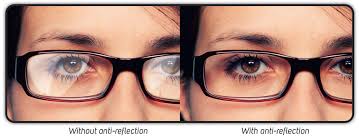I personally would not choose any lens without anti-reflective coating for activities that require this so I suggest you do the same thing. Because polycarbonate lenses are not glass you can use a glass etching compound to remove the AR coating without damaging the lenses.
 Anti Reflective Coating Wise Eyes Optical
Anti Reflective Coating Wise Eyes Optical
Anti-reflective coatings can be applied to the back of sunglass lenses 2.

Glasses without anti reflective coating. Caring for glasses with anti-reflective. AR coating is added to lenses to reduce glare caused by light hitting the back of the lenses. Some people wonder if AR affects polarized sunglasses differently.
The floor of the lens thats handled with the anti-reflective tech can revel in damage whilst it encounters situations in which youre close to both warmth or cold. Anti-reflective coating also known as AR anti-glare no-glare or glare-free coating can provide benefits to your vision. In complex systems such as telescopes and microscopes the reduction in reflections also improves the contrast of the image by.
Anti-reflective coatings are incredibly thin. These micro-thin layers consist of zirconium-dioxide titanium-dioxide aluminum-oxide or silica dioxide. While it may look rough that film flaking off your lenses doesnt mean your glasses have reached the end of the line most likely its simply the anti-reflective coating thats peeling away.
Although anti-reflective coatings are really not any dirtier than a regular pair of glasses theyre more noticeable because there isnt any glare to hide the dirt. Intact AR coating reduces glare and lets your peepers shine through more clearly but a peeling anti-glare coat impairs both your sight and your style. The same is true when youre speaking to someone face to face in a bright setting.
Anti-Reflective coating is also known as anti-glare or AR works by eliminating reflections of light from your lens surfaces. This way the reflections can be blocked up to 9999 from entering the eyes or causing any harm. The anti-glare coating that you can discover on lenses today is appropriate for day to day wear.
Lots of poor quality light. The entire multilayer AR coating stack generally is only about 02 to 03 microns thick or about 002 percent two one-hundredths of 1 percent of the thickness of a standard eyeglass lens. On the other hand anti-reflective coating glasses do have a few negatives.
An anti-reflective coating on your glasses can also be beneficial if you spend a great deal of time on the computer. The anti-glare coating glasses have a coating that is applied to the inner as well as the outer surface of the lenses. Crizal is the best known anti-reflective coating on the market and also the best and the most expensive.
Crizal Lenses No Glare Coating. As a result an increasing amount of customers decide to purchase anti-reflective coating for their glasses. As a result you may have to clean.
Your no glare glasses will work fine without anti-reflective coating but the relaxation to your eyes and improved vision are usually worth it. How anti-reflective coating works. Put simply it doesnt and we highly recommend AR for both non-polarized and polarized sunglass lenses to minimize light transmission and glare from behind.
The anti-reflective coating consists of layers of metal oxides applied to the front and back of glass plastic or polycarbonate lenses. It is also generally easier and cheaper to coat high index glasses And that is correct. An antireflective or anti-reflection AR coating is a type of optical coating applied to the surface of lenses and other optical elements to reduce reflectionIn typical imaging systems this improves the efficiency since less light is lost due to reflection.
Before you choose Crizal think carefully about whether you even need or want anti-reflective coating on your glasses. Keep reading for everything you need to know about this step including the all-important question of whether and how you can add anti-reflective coating to your eyewear during or after the purchase. If you have glasses without anti-glare coating youve probably had issues with taking good pictures or finding the right angle for video calls.
Do I Need an Anti-Reflective Coating on Polarized Sunglasses. Any bright lights or camera flash will reflect off of your lenses. What you ought to keep away from with this technology are temperature extremes.
This modern invention improves vision and makes your eyeglasses more visually attractive. Im picky about my glasses being dirty either smudges or bits of lint I have also concluded that having an anti-reflective coating is non-negotiable for me after trying a pair without it. Anti-reflection coatings are particularly suited to high-index lenses as these reflect more light without the coating than a lower-index lens a consequence of the Fresnel equations.
The necessity of anti-reflective coating on transition lenses. The most popular etching compound used for this purpose contains sulfuric acid but if you find a product that contains hydrofluoric acid it also works according to a lens manufacturer. Working on a computer for an extended period of time can lead to eye strain as your eye muscles struggle to view specific areas of the monitor and battle the glareTypical symptoms of eyestrain while working on the computer include blurry vision dry eyes and irritation.
Without reflections light can travel through the lens and reach the eye creating a more natural image that is not obstructed by the lens surface. Typically applied on both sides of an eyeglass lens this coating also known as AR or anti-glare reduces the amount of light reflected off the surfaces of spectacle lenses. How To Clean Glasses Without Scratching Your Lenses.
The use of antiglare coating on older lenses is technologically possible but the lens manufacturing companies avoid this because if the lens is scratched it may reduce the value of the applied coating. Theyre can look dirty due to the clearness of the lenses. Are the premium super hydrophobic and oleophobic ones better than the basic one.